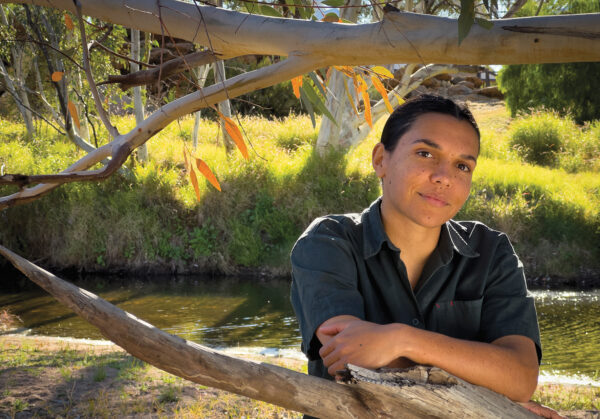
GROWING up in Sydney, Lille Madden loved spending time in nature with her family and watching National Geographic TV programs. It led the Arrernte, Bundjalung and Kalkadoon woman to study and work in conservation and land management and become a passionate advocate for the environment.
The quietly spoken daughter of art curator Hetti Perkins and granddaughter of the first Central
Land Council chair, the late Charles Perkins, Ms Madden is also a storyteller. She presented and cowrote Healing Country a three-part ABC social media series where she yarned with young Aboriginal people about what they were doing to protect their country.
Now the 30-year-old is helping women to stay on remote country and keep their connection to culture women’s land management facilitator.
Ms Madden, who worked as an NT Parks ranger at the Mparntwe (Alice Springs) Telegraph Station for more than two years before joining the CLC, will build women’s skills by identifying training and ranger exchange opportunities. She will support women to present about their research projects at conferences and will network widely to attract women to the CLC’s ranger program.
“Women hold a lot of responsibility to families, communities, country and culture and my role is to support them in land management and help employ and elevate women within the organisation,” she said.
Ms Madden also acknowledged the work of her predecessors, Kim Webeck and Fiona Webb.
“It’s really important to acknowledge that this role and its funding was hard-won by the women all throughout the Central Desert.
“The work is an opportunity to connect with remote communities to help keep their people healthy, culture strong, sacred sites protected for many more generations to come,” she said.
Ms Madden has met about half the CLC ranger groups and says working with women has been a powerful experience. “I feel very lucky to be able to work with some amazing knowledge holders who all share a similar vision, cause and passion for their country.”
Moving to Mparntwe three years ago was a big life decision. “It was very important for me to go back to my grandfather’s country to learn culture and remain connected to that place.
“Aboriginal culture sees everything as equal and the world would be a much better place if people had this understanding.
“I constantly think about what our elders both past and present have done for Aboriginal people and what our responsibilities are as the next generation.
“What will it be like for my future children as well as for all Aboriginal children? What’s their connection going to be? I want to keep that connection strong.”
